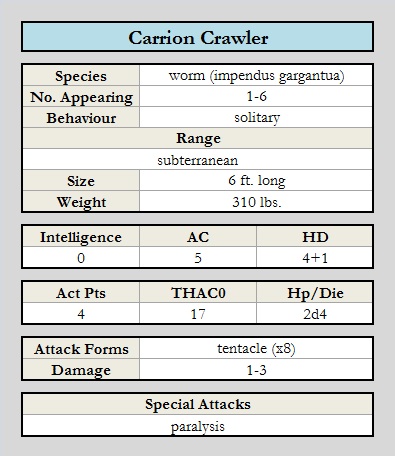Carrion Crawler
In appearance and movement like a caterpillar, this disturbing creature has a hard, leathery exoskeleton and a large, scuttling feet that appear like hooves. It is too heavy to move over vertical surfaces, but it is strong enough to force open doors or drag victims into corners where they can be eaten later. Very rarely, a carrion crawler will lay eggs in a victim, in order to provide the young with food when they hatch.
It tends to attack slow moving or unsuspecting creatures, striking out with its eight tentacles in an attempt to paralyze its prey so that it can be consumed patiently. Each individual tentacle hit must be individually saved for, if a defender is struck more than once. This makes the carrion crawler a very effective predator. When attacking, the creature will spread its eight attacks among defenders within an arc of 180° in front of itself.
Those that fail to save will be paralyzed for 3–12 rounds. If the carrion crawler has 3-4 rounds to linger over a victim, it can inject enough poison to paralyze the victim for three or four days, long enough for the victim to die of thirst. After this full paralyzation, the carrion crawler will cover the victim with a thin layer of slime to keep the body fresh for eating later.
The paralyzation is a type of poison, which cannot be simply removed from the carrion crawler upon death and reused, as it loses potency within a few minutes. However, the powder can be invigorated by someone with knowledge of poisons. Apothecaries call the invigorated poison "impend gum", an insidious effect that can be applied to a weapon before combat (affects enemies once per application).
See Bestiary.
